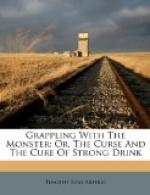ALCOHOL REDUCES THE TEMPERATURE OF THE BODY,
instead of increasing it; and it has even been used in fevers as an anti-pyretic. So uniform has been the testimony of physicians in Europe and this country as to the cooling effects of alcohol, that Dr. Wood says, in his Materia Medica, “that it does not seem worth while to occupy space with a discussion of the subject.” Liebermeister, one of the most learned contributors to Zeimssen’s Cyclopaedia of the Practice of Medicine, 1875, says: “I long since convinced myself, by direct experiments, that alcohol, even in comparatively large doses, does not elevate the temperature of the body in either well or sick people.” So well had this become known to Arctic voyagers, that, even before physiologists had demonstrated the fact that alcohol reduced, instead of increasing, the temperature of the body, they had learned that spirits lessened their power to withstand extreme cold. “In the Northern regions,” says Edward Smith, “it was proved that the entire exclusion of spirits was necessary, in order to retain heat under these unfavorable conditions.”
ALCOHOL DOES NOT GIVE STRENGTH.
If alcohol does not contain tissue-building material, nor give heat to the body, it cannot possibly add to its strength. “Every kind of power an animal can generate,” says Dr. G. Budd, F.R.S., “the mechanical power of the muscles, the chemical (or digestive) power of the stomach, the intellectual power of the brain—accumulates through the nutrition of the organ on which it depends.” Dr. F.R. Lees, of Edinburgh, after discussing the question, and educing evidence, remarks: “From the very nature of things, it will now be seen how impossible it is that alcohol can be strengthening food of either kind. Since it cannot become a part of the body, it cannot consequently contribute to its cohesive, organic strength, or fixed power; and, since it comes out of the body just as it went in, it cannot, by its decomposition, generate heat-force.”
Sir Benjamin Brodie says: “Stimulants do not create nervous power; they merely enable you, as it were, to use up that which is left, and then they leave you more in need of rest than before.”
Baron Liebig, so far back as 1843, in his “Animal Chemistry,” pointed out the fallacy of alcohol generating power. He says: “The circulation will appear accelerated at the expense of the force available for voluntary motion, but without the production of a greater amount of mechanical force.” In his later “Letters,” he again says: “Wine is quite superfluous to man, * * * it is constantly followed by the expenditure of power”—whereas, the real function of food is to give power. He adds: “These drinks promote the change of matter in the body, and are, consequently, attended by an inward loss of power, which ceases to be productive, because it is not employed in overcoming outward difficulties—i.e., in working.” In other words, this great chemist asserts that alcohol abstracts the power of the system from doing useful work in the field or workshop, in order to cleanse the house from the defilement of alcohol itself.




